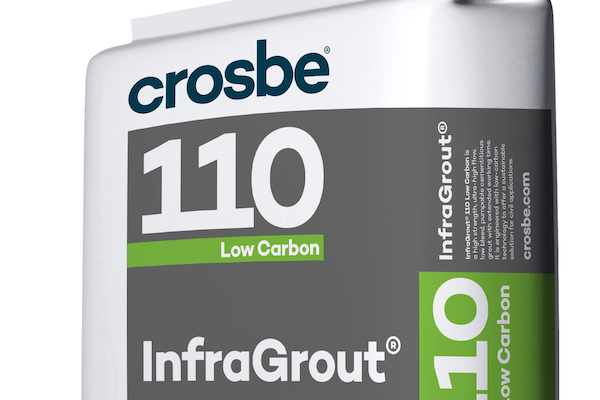Groundbreaking Low-Carbon Cementitious Grouts
Australian manufacturer of cementitious grouts Crosbe has unveiled a groundbreaking transition to low-carbon grouts, a result of extensive R&D at its western Sydney headquarters. The pioneering products, InfraGrout 110 Low Carbon and InfraGrout 190 Low Carbon, are the first to harness Crosbe’s advanced low-carbon technology, promising more products in the future.
Company founder and Managing Director Albert Haddad emphasises that the new products are not just a result of extensive R&D, but also a direct response to customer requests, demonstrating Crosbe’s commitment to understanding and meeting market needs.
“It is well known that the cement industry generates approximately eight per cent of all global CO2 emissions, with four billion tonnes of cement produced each year. For every tonne of cement produced, one tonne of CO2 is released into the atmosphere. To put that in context, if the cement industry was a country, it would be the third-largest emitter of CO2 in the world,” said Haddad.
“For Crosbe, the most impactful way to reduce carbon emissions is to reduce our products’ ordinary Portland cement content by using supplementary cementitious materials (SCMs) and alternative cements. Our new low-carbon technology is based on these principles. While the use of SCMs is not a new concept, there is typically a trade-off in the performance of the end products, particularly when replacing most of the cement content with SCMs.
“We have developed the technology to reduce the cement content in our products by up to 70 per cent and the embodied carbon by up to 48 per cent. By applying our low-carbon technology across all product lines, Crosbe can potentially prevent some 7,000 tonnes of CO2 from being emitted into the atmosphere each year based on our current volumes,” he added.
InfraGrout 110 Low Carbon is a high-strength, ultra-high-flow, zero-bleed, pumpable cementitious grout with extended working time. It is engineered for civil applications, including grouting PT bridge ducts, ground anchors, and soil nails.
InfraGrout 110 Low Carbon is approved by Transport for NSW and other Australian road authorities. It is also expected to receive Environmental Product Declaration (EPD) accreditation, which involves a full lifecycle assessment and publication of the data.
InfraGrout 190 Low Carbon is a pumpable, thixotropic cementitious grout specifically designed to encapsulate roof bolts and cable anchors requiring top-down grouting methods. It has been formulated with advanced additives and supplementary cementitious materials to form a low-shrinking, low-chloride, high-yield, and, ultimately, high-compressive-strength grout.
“As an Australian manufacturer that undertakes all R&D in our premises at Seven Hills, we can develop products that suit the specific needs of the Australian market. We’ve started talking to customers about the new low-carbon products and had significant interest in using them on major infrastructure projects,” said Haddad.
The InfraGrout products can be quickly and easily mixed on-site with only the addition of water. They are packaged in rain and tear-resistant recyclable polyethylene bags made from 30 per cent recycled material.
The new low-carbon variants of the InfraGrout products will be available alongside the existing ones, but they are expected to be replaced gradually. Over time, low-carbon technology will also be incorporated into other Crosbe products.
Crosbe is an Australian-owned and operated manufacturer of cementitious products. For more information, visit crosbe.com or phone at 1300 797 560.

